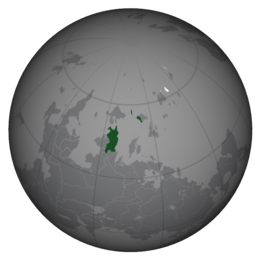Amilagro
This article is incomplete because it is pending further input from participants, or it is a work-in-progress by one author. Please comment on this article's talk page to share your input, comments and questions. Note: To contribute to this article, you may need to seek help from the author(s) of this page. |
Royal Federation of Amilagro Kæungruigiføderationit Vørmørk (Amilagran) Vëërmërkon Kunjingaswikittoorsjaio (Saameri) Kungiqquippiqarqaxirpuqquike Vermek (Napartaxiq) | |
|---|---|
| Motto: “Vid, hvat ir kæmpar før.” Know what you're fighting for. | |
 Amilagro (green) on a globe | |
| Location | Northern Thuadia, west of the Njorish sea |
| Capital and | Aengber |
| Official languages | Amilagran Saameri Napartaxiq |
| Ethnic groups (2023) | TBA |
| Religion (2023) | TBA |
| Demonym(s) | Sukong |
| Government | Federal assembly-independent directorial contitutional monarchy |
| Kristina II. | |
| Jan Frederikson | |
| Legislature | Federal Sitting |
| Federal House | |
| Federal Representation | |
| Area | |
• | 276,164 km2 (106,628 sq mi) (not ranked) |
| Population | |
• 2024 estimate | |
• 2023 census | 6,710,509 |
• Density | 24.299/km2 (62.9/sq mi) (not ranked) |
| GDP (PPP) | 2023 estimate |
• Total | |
• Per capita | |
| GDP (nominal) | 2023 estimate |
• Total | |
• Per capita | |
| Gini (2023) | 26.6 low (not ranked) |
| HDI (2023) | very high (not ranked) |
| Currency | Amilagran Kråne (kr) (AKR) |
| Time zone | UTC-4, -5 |
| Date format | dd.mm.yyyy |
| Driving side | left |
| Internet TLD | .am |
The Royal Federation of Amilagro, commonly known as Amilagro, natively as Vørmørk, Vëërmërk and Vermek, is an island country located in northern Thuadia. It is a federal constitutional monarchy consisting of 15 communes, and a capital district Aengber. Amilagro controls six major islands, and 23 small islands, with 6 of these islands being shared with the Northern Union and lacking a permanent population, as they serve for research and economic activities. It is one of the most northern countries in Anteria and as a result is very sparsely populated. The largest city is the capital of Aengber with 750 thousand inhabitants.
Amilagro was first settled by the Inguit Napartaxiqs around 2,000 BCE along with Arkkonesia, spreading across all of its islands, eventually forming various civilizations with different and unique cultures and styles of governance connected by a common language. Following the arrival of the Finnic Saameris in 450 BCE and the Germanic Vermerkis in 530 AD, the Napartaxiq were pushed further north to the previously uninhabited islands. The Amilagran islands were largely home to city states and small feudal states with a slow unification process being started in 1587 by King [something] of Aengber. Parts of Amilagro's land have since exchanged hands quite a few times, mainly with Sauthar. In 1868 Amilagro gained control over all of its currently owned land and set up provinces whose leaders were appointed by the monarch. In 1927, the Seventeenth Constitutional Amendment was passed, officially ending the absolute monarchy and setting up a predicesor to the current system of governance as a unitary state granting minority rights to the Saameris, with the current system forming in 1958 finally granting governance rights to the Napartaxiqs.
The Amilagran federal government is a federal assembly-independent directorial constitutional monarchy with perks of a direct democracy. It has three seperate branches, those being the legislative, executive and judicial. It has a bicameral legislature made up of the Federal Representation, a lower house based on population, and the Federal House, an upper house with two members for each commune. The federal constitution grants substantial autonomy to the communes and districts.
[ECONOMY]
Etymology
The exonym "Amilagro" (IPA: /ə'mɪləgroʊ/ ə-MIL-ə-groh) has appeared in the Common language since the 12th century, when it was supposedly picked up from the phrase "a mil å grou" in Langheersbergic, which was commonly used to refer to the country, especially during the Amilagran invasions. The rough translation of the term would be "a mill on a field", referring to a folk song often sung by Amilagran soliders when invading, which was supposed to bring good luck and prosperity. This tradition lasted until the 18th century, when war songs started becoming increasingly more common.
Vørmørk (IPA: /'vøːrmørʃ/) is the endonym for the country. The etymology has been traced to old Amilagran, where this name started becoming widely used, meaning simply "our field", derived from merging the two words "vør" + "mørk". Another theory, which has struggled to gain recognition and is widely considered as a folk tale among the Amilagran linguistic community is that the country was named for its alleged founder and first king Vørmør, although there is no evidence to prove that he ever existed, being seen as a folk hero rather than a legitimate historical figure.
This name has also been borrowed by the two other languages native to Amilagro, those being Saameri and Napartaxiq, with the names Vëërmërk and Vermek respectively.
History
Geography
Climate
Biodiversity and conservation
Government and politics
National government
Political parties
Subdivisions
Foreign relations
Military
Criminal justice and law enforcement
Economy
Energy
Transport
Public policy
Science and technology
Taxes
Demographics
Population
Language
Religion
Urbanization
Health
Education
Culture
Literature
Mass media
Theatre
Visual arts
Music
Fashion
Cinema
Cuisine
Sports
See also
Notes
External links

